Thought Control: Social Influencers on Radicalization & Crime in UAE
VerifiedAdded on 2023/03/23
|16
|3708
|37
Project
AI Summary
This research project investigates the influence of social influencers on radicalization and criminal behavior in the United Arab Emirates. It identifies relevant social influencers, including digital, religious, and political figures, and examines their role in fostering interest in radicalization and criminal activities. The study explores the impacts of these influencers on radicalization and crime within the UAE context, while also considering the roles of parents, society, and the government in countering these influences. Furthermore, it proposes necessary actions and policies to address the problem, highlighting the importance of understanding radicalization as a process influenced by both 'push' and 'pull' factors, including political, economic, ideological, and psycho-social drivers. The literature review emphasizes the need for empirical evidence and explores the use of the internet by violent radicals for propaganda, recruitment, and communication, suggesting the importance of monitoring and counter-publicity programs, and the promotion of moderate voices through online platforms.
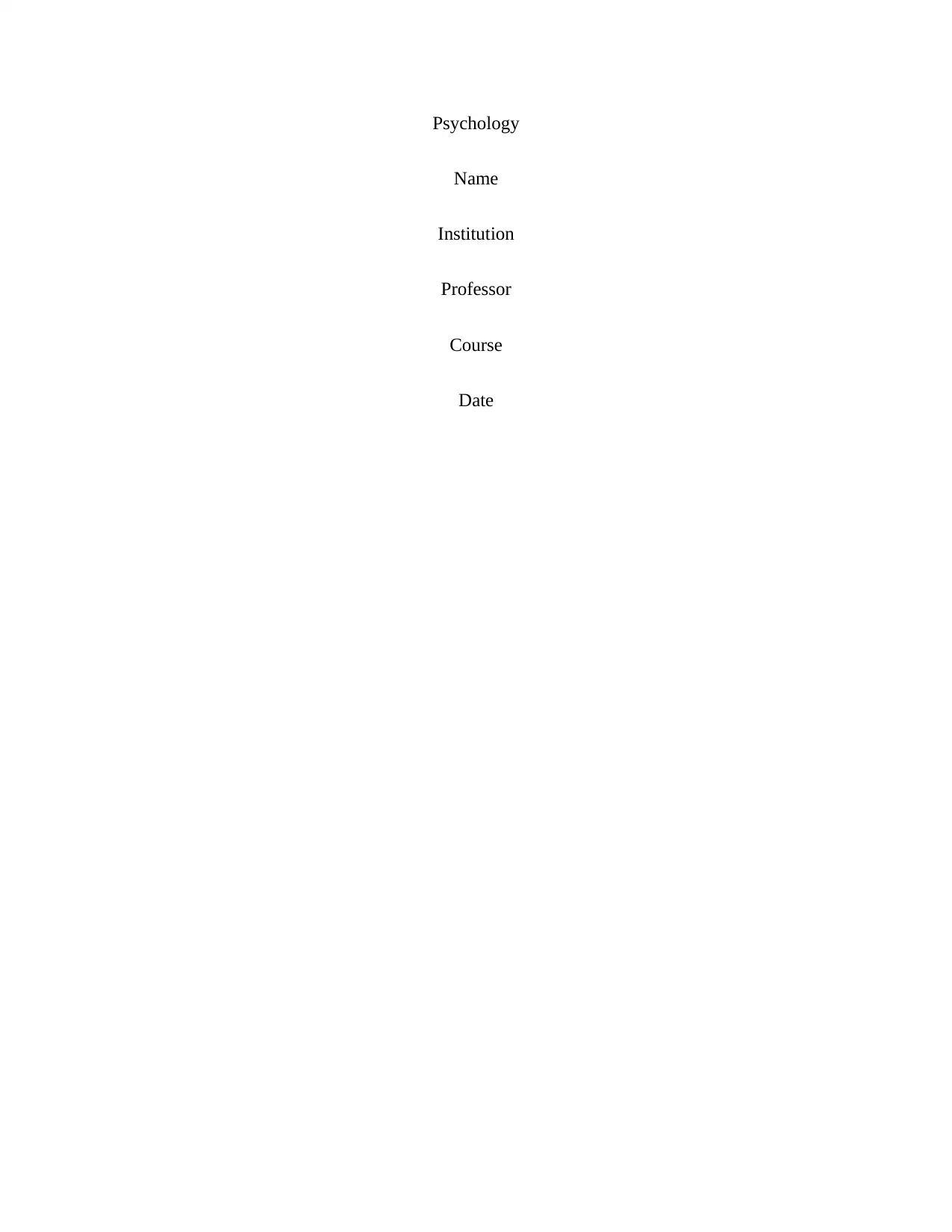
Psychology
Name
Institution
Professor
Course
Date
Name
Institution
Professor
Course
Date
Paraphrase This Document
Need a fresh take? Get an instant paraphrase of this document with our AI Paraphraser
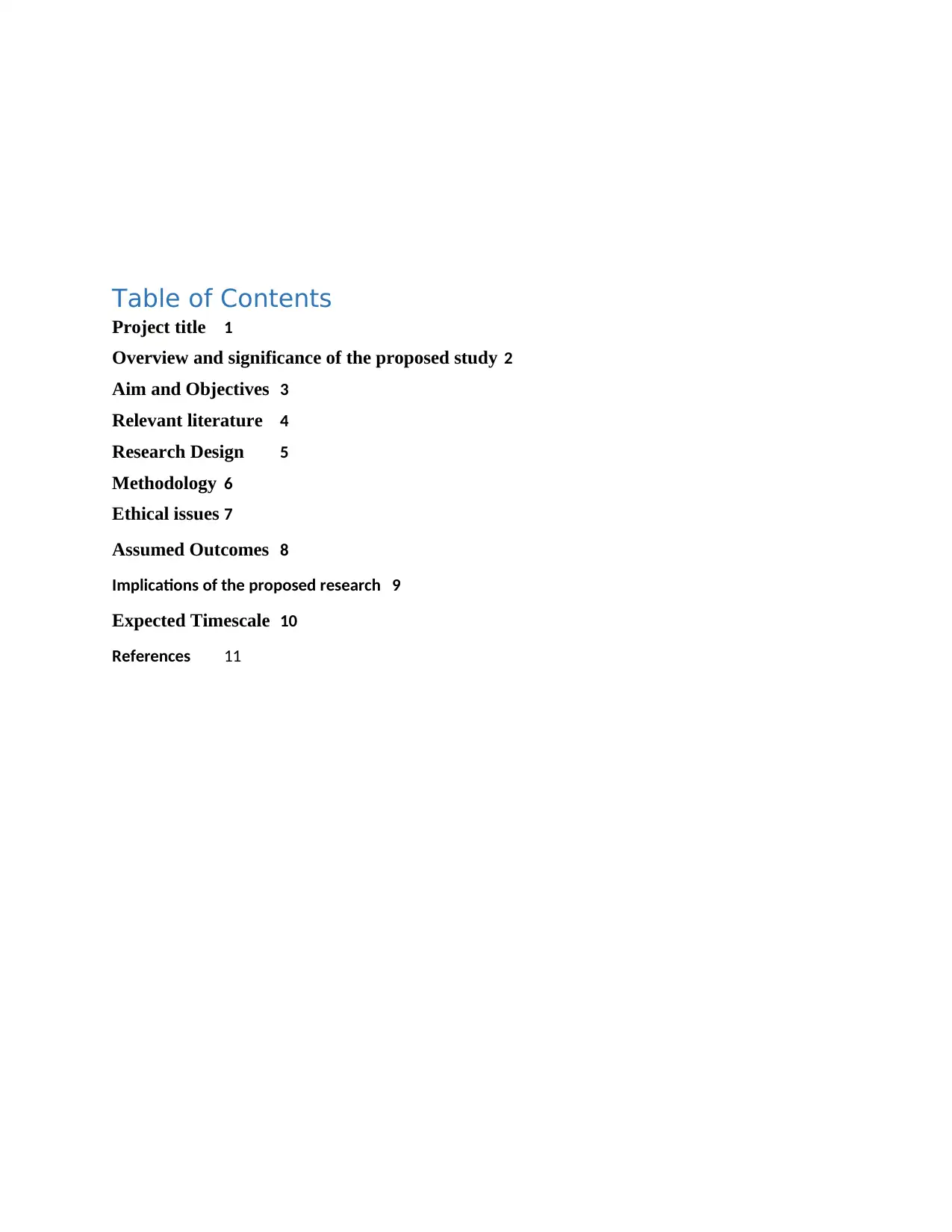
Table of Contents
Project title 1
Overview and significance of the proposed study 2
Aim and Objectives 3
Relevant literature 4
Research Design 5
Methodology 6
Ethical issues 7
Assumed Outcomes 8
Implications of the proposed research 9
Expected Timescale 10
References 11
Project title 1
Overview and significance of the proposed study 2
Aim and Objectives 3
Relevant literature 4
Research Design 5
Methodology 6
Ethical issues 7
Assumed Outcomes 8
Implications of the proposed research 9
Expected Timescale 10
References 11
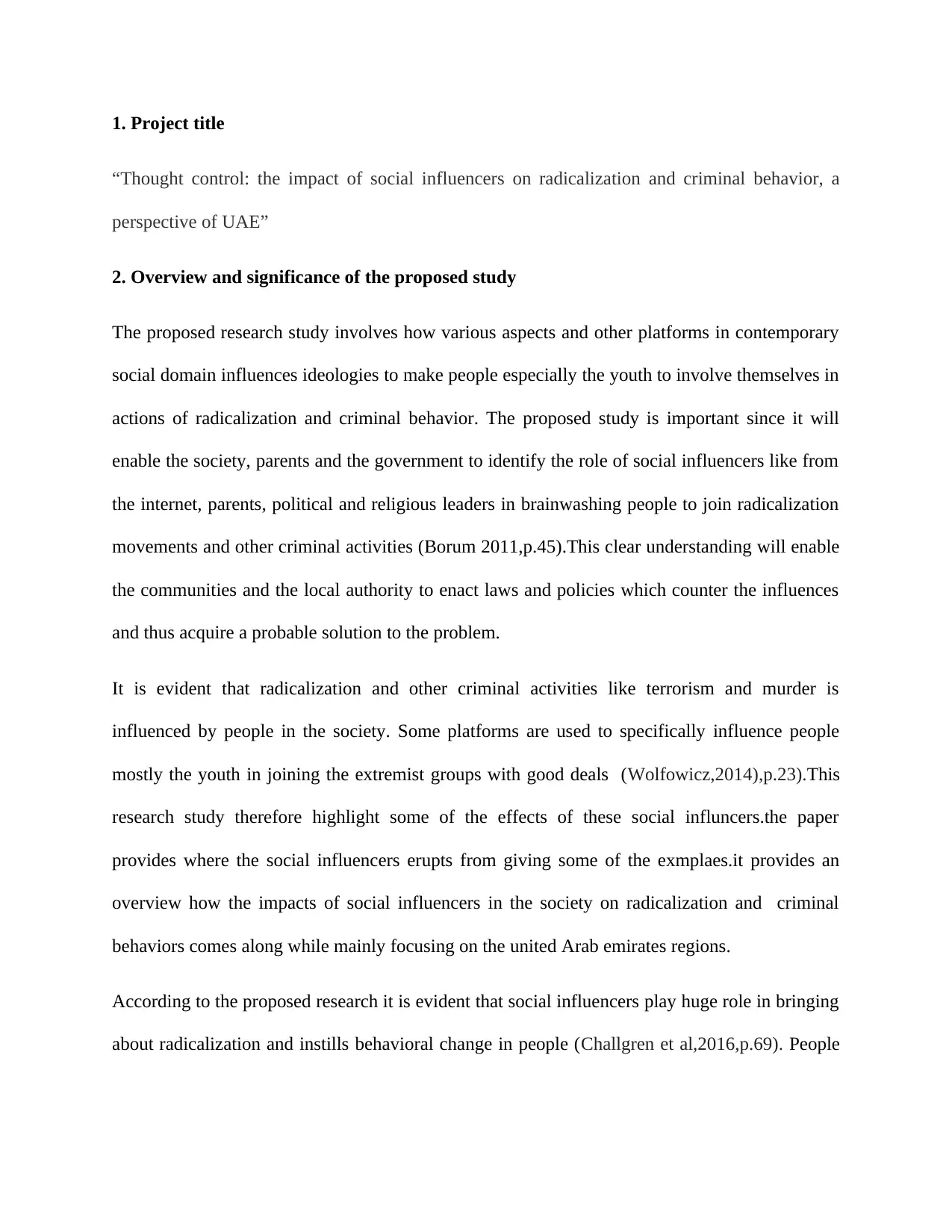
1. Project title
“Thought control: the impact of social influencers on radicalization and criminal behavior, a
perspective of UAE”
2. Overview and significance of the proposed study
The proposed research study involves how various aspects and other platforms in contemporary
social domain influences ideologies to make people especially the youth to involve themselves in
actions of radicalization and criminal behavior. The proposed study is important since it will
enable the society, parents and the government to identify the role of social influencers like from
the internet, parents, political and religious leaders in brainwashing people to join radicalization
movements and other criminal activities (Borum 2011,p.45).This clear understanding will enable
the communities and the local authority to enact laws and policies which counter the influences
and thus acquire a probable solution to the problem.
It is evident that radicalization and other criminal activities like terrorism and murder is
influenced by people in the society. Some platforms are used to specifically influence people
mostly the youth in joining the extremist groups with good deals (Wolfowicz,2014),p.23).This
research study therefore highlight some of the effects of these social influncers.the paper
provides where the social influencers erupts from giving some of the exmplaes.it provides an
overview how the impacts of social influencers in the society on radicalization and criminal
behaviors comes along while mainly focusing on the united Arab emirates regions.
According to the proposed research it is evident that social influencers play huge role in bringing
about radicalization and instills behavioral change in people (Challgren et al,2016,p.69). People
“Thought control: the impact of social influencers on radicalization and criminal behavior, a
perspective of UAE”
2. Overview and significance of the proposed study
The proposed research study involves how various aspects and other platforms in contemporary
social domain influences ideologies to make people especially the youth to involve themselves in
actions of radicalization and criminal behavior. The proposed study is important since it will
enable the society, parents and the government to identify the role of social influencers like from
the internet, parents, political and religious leaders in brainwashing people to join radicalization
movements and other criminal activities (Borum 2011,p.45).This clear understanding will enable
the communities and the local authority to enact laws and policies which counter the influences
and thus acquire a probable solution to the problem.
It is evident that radicalization and other criminal activities like terrorism and murder is
influenced by people in the society. Some platforms are used to specifically influence people
mostly the youth in joining the extremist groups with good deals (Wolfowicz,2014),p.23).This
research study therefore highlight some of the effects of these social influncers.the paper
provides where the social influencers erupts from giving some of the exmplaes.it provides an
overview how the impacts of social influencers in the society on radicalization and criminal
behaviors comes along while mainly focusing on the united Arab emirates regions.
According to the proposed research it is evident that social influencers play huge role in bringing
about radicalization and instills behavioral change in people (Challgren et al,2016,p.69). People
⊘ This is a preview!⊘
Do you want full access?
Subscribe today to unlock all pages.

Trusted by 1+ million students worldwide
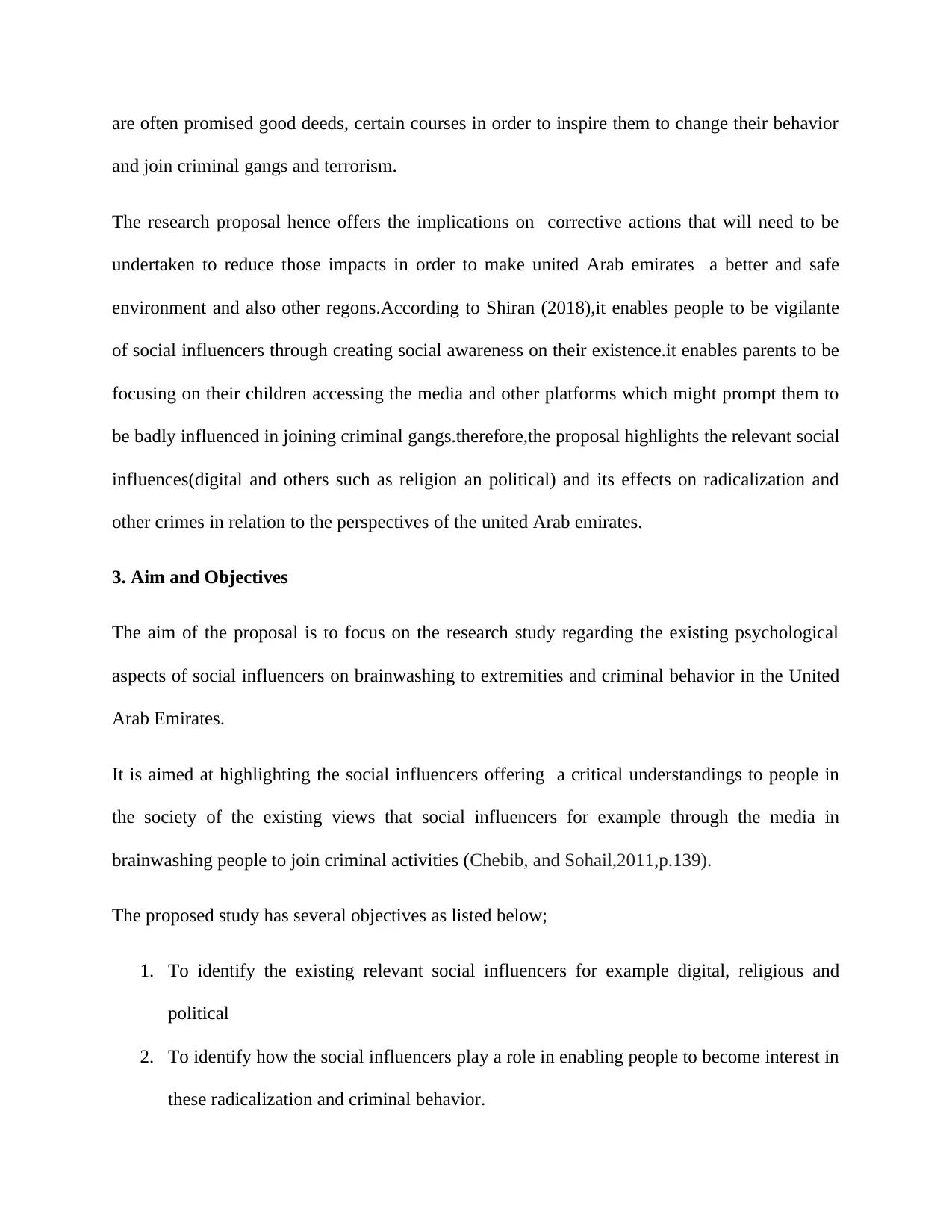
are often promised good deeds, certain courses in order to inspire them to change their behavior
and join criminal gangs and terrorism.
The research proposal hence offers the implications on corrective actions that will need to be
undertaken to reduce those impacts in order to make united Arab emirates a better and safe
environment and also other regons.According to Shiran (2018),it enables people to be vigilante
of social influencers through creating social awareness on their existence.it enables parents to be
focusing on their children accessing the media and other platforms which might prompt them to
be badly influenced in joining criminal gangs.therefore,the proposal highlights the relevant social
influences(digital and others such as religion an political) and its effects on radicalization and
other crimes in relation to the perspectives of the united Arab emirates.
3. Aim and Objectives
The aim of the proposal is to focus on the research study regarding the existing psychological
aspects of social influencers on brainwashing to extremities and criminal behavior in the United
Arab Emirates.
It is aimed at highlighting the social influencers offering a critical understandings to people in
the society of the existing views that social influencers for example through the media in
brainwashing people to join criminal activities (Chebib, and Sohail,2011,p.139).
The proposed study has several objectives as listed below;
1. To identify the existing relevant social influencers for example digital, religious and
political
2. To identify how the social influencers play a role in enabling people to become interest in
these radicalization and criminal behavior.
and join criminal gangs and terrorism.
The research proposal hence offers the implications on corrective actions that will need to be
undertaken to reduce those impacts in order to make united Arab emirates a better and safe
environment and also other regons.According to Shiran (2018),it enables people to be vigilante
of social influencers through creating social awareness on their existence.it enables parents to be
focusing on their children accessing the media and other platforms which might prompt them to
be badly influenced in joining criminal gangs.therefore,the proposal highlights the relevant social
influences(digital and others such as religion an political) and its effects on radicalization and
other crimes in relation to the perspectives of the united Arab emirates.
3. Aim and Objectives
The aim of the proposal is to focus on the research study regarding the existing psychological
aspects of social influencers on brainwashing to extremities and criminal behavior in the United
Arab Emirates.
It is aimed at highlighting the social influencers offering a critical understandings to people in
the society of the existing views that social influencers for example through the media in
brainwashing people to join criminal activities (Chebib, and Sohail,2011,p.139).
The proposed study has several objectives as listed below;
1. To identify the existing relevant social influencers for example digital, religious and
political
2. To identify how the social influencers play a role in enabling people to become interest in
these radicalization and criminal behavior.
Paraphrase This Document
Need a fresh take? Get an instant paraphrase of this document with our AI Paraphraser
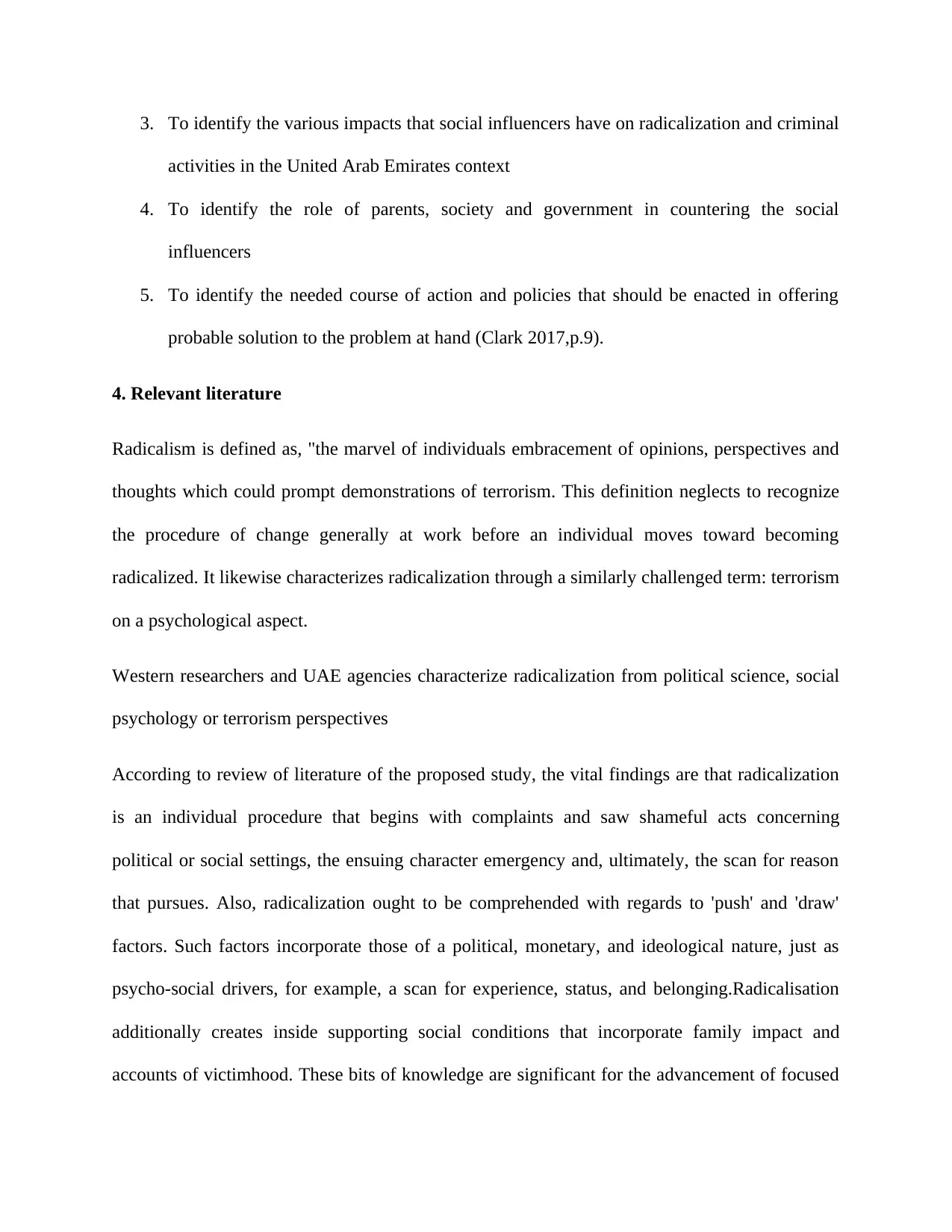
3. To identify the various impacts that social influencers have on radicalization and criminal
activities in the United Arab Emirates context
4. To identify the role of parents, society and government in countering the social
influencers
5. To identify the needed course of action and policies that should be enacted in offering
probable solution to the problem at hand (Clark 2017,p.9).
4. Relevant literature
Radicalism is defined as, "the marvel of individuals embracement of opinions, perspectives and
thoughts which could prompt demonstrations of terrorism. This definition neglects to recognize
the procedure of change generally at work before an individual moves toward becoming
radicalized. It likewise characterizes radicalization through a similarly challenged term: terrorism
on a psychological aspect.
Western researchers and UAE agencies characterize radicalization from political science, social
psychology or terrorism perspectives
According to review of literature of the proposed study, the vital findings are that radicalization
is an individual procedure that begins with complaints and saw shameful acts concerning
political or social settings, the ensuing character emergency and, ultimately, the scan for reason
that pursues. Also, radicalization ought to be comprehended with regards to 'push' and 'draw'
factors. Such factors incorporate those of a political, monetary, and ideological nature, just as
psycho-social drivers, for example, a scan for experience, status, and belonging.Radicalisation
additionally creates inside supporting social conditions that incorporate family impact and
accounts of victimhood. These bits of knowledge are significant for the advancement of focused
activities in the United Arab Emirates context
4. To identify the role of parents, society and government in countering the social
influencers
5. To identify the needed course of action and policies that should be enacted in offering
probable solution to the problem at hand (Clark 2017,p.9).
4. Relevant literature
Radicalism is defined as, "the marvel of individuals embracement of opinions, perspectives and
thoughts which could prompt demonstrations of terrorism. This definition neglects to recognize
the procedure of change generally at work before an individual moves toward becoming
radicalized. It likewise characterizes radicalization through a similarly challenged term: terrorism
on a psychological aspect.
Western researchers and UAE agencies characterize radicalization from political science, social
psychology or terrorism perspectives
According to review of literature of the proposed study, the vital findings are that radicalization
is an individual procedure that begins with complaints and saw shameful acts concerning
political or social settings, the ensuing character emergency and, ultimately, the scan for reason
that pursues. Also, radicalization ought to be comprehended with regards to 'push' and 'draw'
factors. Such factors incorporate those of a political, monetary, and ideological nature, just as
psycho-social drivers, for example, a scan for experience, status, and belonging.Radicalisation
additionally creates inside supporting social conditions that incorporate family impact and
accounts of victimhood. These bits of knowledge are significant for the advancement of focused
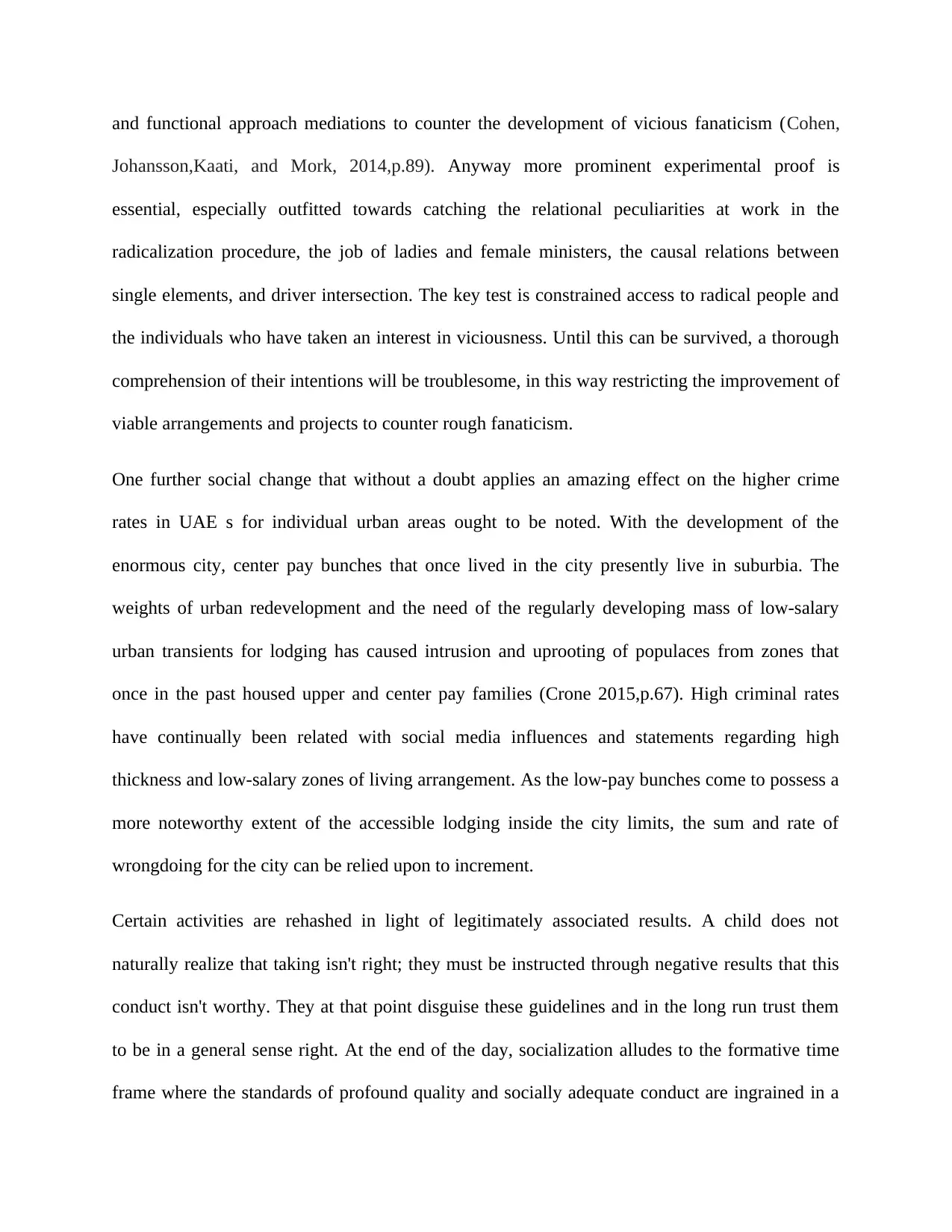
and functional approach mediations to counter the development of vicious fanaticism (Cohen,
Johansson,Kaati, and Mork, 2014,p.89). Anyway more prominent experimental proof is
essential, especially outfitted towards catching the relational peculiarities at work in the
radicalization procedure, the job of ladies and female ministers, the causal relations between
single elements, and driver intersection. The key test is constrained access to radical people and
the individuals who have taken an interest in viciousness. Until this can be survived, a thorough
comprehension of their intentions will be troublesome, in this way restricting the improvement of
viable arrangements and projects to counter rough fanaticism.
One further social change that without a doubt applies an amazing effect on the higher crime
rates in UAE s for individual urban areas ought to be noted. With the development of the
enormous city, center pay bunches that once lived in the city presently live in suburbia. The
weights of urban redevelopment and the need of the regularly developing mass of low-salary
urban transients for lodging has caused intrusion and uprooting of populaces from zones that
once in the past housed upper and center pay families (Crone 2015,p.67). High criminal rates
have continually been related with social media influences and statements regarding high
thickness and low-salary zones of living arrangement. As the low-pay bunches come to possess a
more noteworthy extent of the accessible lodging inside the city limits, the sum and rate of
wrongdoing for the city can be relied upon to increment.
Certain activities are rehashed in light of legitimately associated results. A child does not
naturally realize that taking isn't right; they must be instructed through negative results that this
conduct isn't worthy. They at that point disguise these guidelines and in the long run trust them
to be in a general sense right. At the end of the day, socialization alludes to the formative time
frame where the standards of profound quality and socially adequate conduct are ingrained in a
Johansson,Kaati, and Mork, 2014,p.89). Anyway more prominent experimental proof is
essential, especially outfitted towards catching the relational peculiarities at work in the
radicalization procedure, the job of ladies and female ministers, the causal relations between
single elements, and driver intersection. The key test is constrained access to radical people and
the individuals who have taken an interest in viciousness. Until this can be survived, a thorough
comprehension of their intentions will be troublesome, in this way restricting the improvement of
viable arrangements and projects to counter rough fanaticism.
One further social change that without a doubt applies an amazing effect on the higher crime
rates in UAE s for individual urban areas ought to be noted. With the development of the
enormous city, center pay bunches that once lived in the city presently live in suburbia. The
weights of urban redevelopment and the need of the regularly developing mass of low-salary
urban transients for lodging has caused intrusion and uprooting of populaces from zones that
once in the past housed upper and center pay families (Crone 2015,p.67). High criminal rates
have continually been related with social media influences and statements regarding high
thickness and low-salary zones of living arrangement. As the low-pay bunches come to possess a
more noteworthy extent of the accessible lodging inside the city limits, the sum and rate of
wrongdoing for the city can be relied upon to increment.
Certain activities are rehashed in light of legitimately associated results. A child does not
naturally realize that taking isn't right; they must be instructed through negative results that this
conduct isn't worthy. They at that point disguise these guidelines and in the long run trust them
to be in a general sense right. At the end of the day, socialization alludes to the formative time
frame where the standards of profound quality and socially adequate conduct are ingrained in a
⊘ This is a preview!⊘
Do you want full access?
Subscribe today to unlock all pages.

Trusted by 1+ million students worldwide
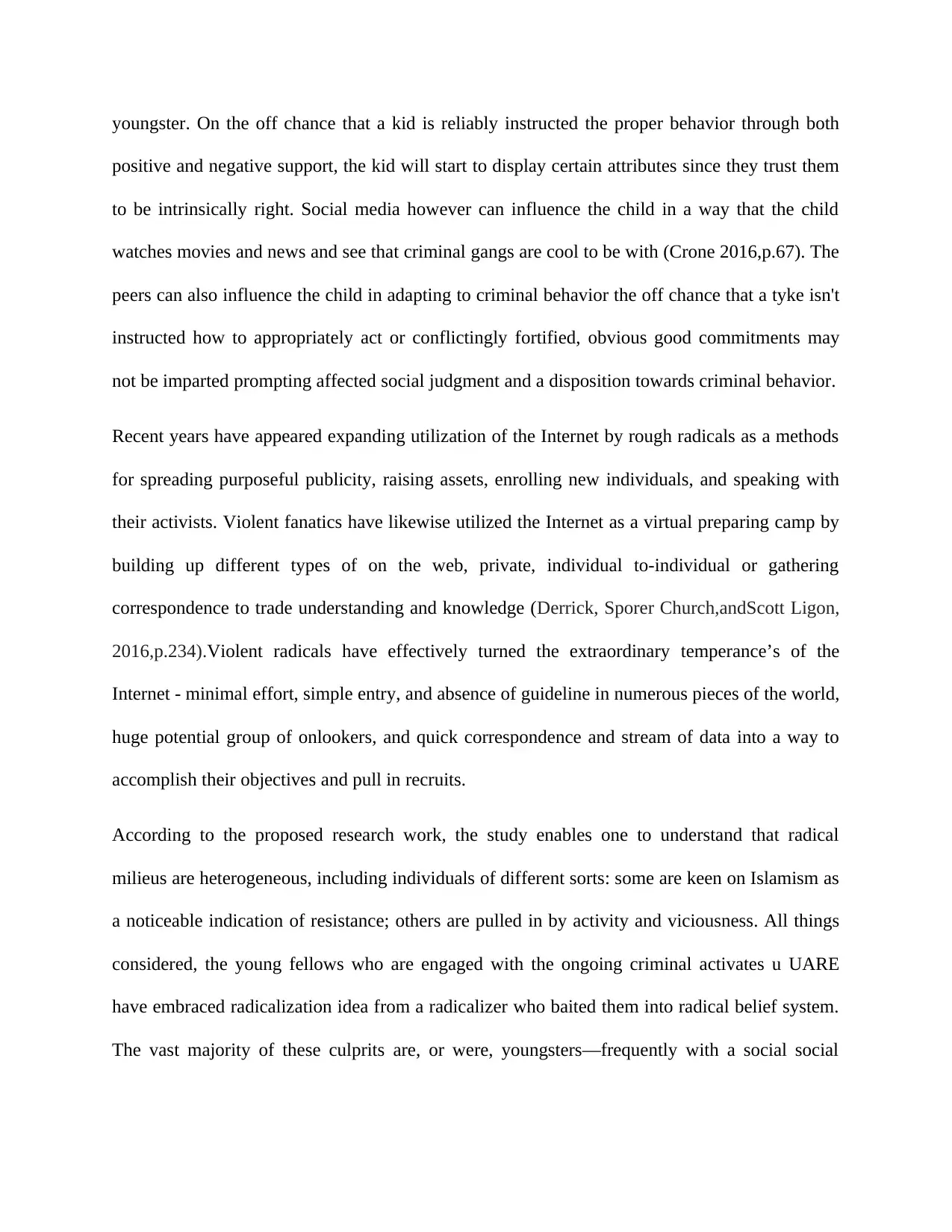
youngster. On the off chance that a kid is reliably instructed the proper behavior through both
positive and negative support, the kid will start to display certain attributes since they trust them
to be intrinsically right. Social media however can influence the child in a way that the child
watches movies and news and see that criminal gangs are cool to be with (Crone 2016,p.67). The
peers can also influence the child in adapting to criminal behavior the off chance that a tyke isn't
instructed how to appropriately act or conflictingly fortified, obvious good commitments may
not be imparted prompting affected social judgment and a disposition towards criminal behavior.
Recent years have appeared expanding utilization of the Internet by rough radicals as a methods
for spreading purposeful publicity, raising assets, enrolling new individuals, and speaking with
their activists. Violent fanatics have likewise utilized the Internet as a virtual preparing camp by
building up different types of on the web, private, individual to-individual or gathering
correspondence to trade understanding and knowledge (Derrick, Sporer Church,andScott Ligon,
2016,p.234).Violent radicals have effectively turned the extraordinary temperance’s of the
Internet - minimal effort, simple entry, and absence of guideline in numerous pieces of the world,
huge potential group of onlookers, and quick correspondence and stream of data into a way to
accomplish their objectives and pull in recruits.
According to the proposed research work, the study enables one to understand that radical
milieus are heterogeneous, including individuals of different sorts: some are keen on Islamism as
a noticeable indication of resistance; others are pulled in by activity and viciousness. All things
considered, the young fellows who are engaged with the ongoing criminal activates u UARE
have embraced radicalization idea from a radicalizer who baited them into radical belief system.
The vast majority of these culprits are, or were, youngsters—frequently with a social social
positive and negative support, the kid will start to display certain attributes since they trust them
to be intrinsically right. Social media however can influence the child in a way that the child
watches movies and news and see that criminal gangs are cool to be with (Crone 2016,p.67). The
peers can also influence the child in adapting to criminal behavior the off chance that a tyke isn't
instructed how to appropriately act or conflictingly fortified, obvious good commitments may
not be imparted prompting affected social judgment and a disposition towards criminal behavior.
Recent years have appeared expanding utilization of the Internet by rough radicals as a methods
for spreading purposeful publicity, raising assets, enrolling new individuals, and speaking with
their activists. Violent fanatics have likewise utilized the Internet as a virtual preparing camp by
building up different types of on the web, private, individual to-individual or gathering
correspondence to trade understanding and knowledge (Derrick, Sporer Church,andScott Ligon,
2016,p.234).Violent radicals have effectively turned the extraordinary temperance’s of the
Internet - minimal effort, simple entry, and absence of guideline in numerous pieces of the world,
huge potential group of onlookers, and quick correspondence and stream of data into a way to
accomplish their objectives and pull in recruits.
According to the proposed research work, the study enables one to understand that radical
milieus are heterogeneous, including individuals of different sorts: some are keen on Islamism as
a noticeable indication of resistance; others are pulled in by activity and viciousness. All things
considered, the young fellows who are engaged with the ongoing criminal activates u UARE
have embraced radicalization idea from a radicalizer who baited them into radical belief system.
The vast majority of these culprits are, or were, youngsters—frequently with a social social
Paraphrase This Document
Need a fresh take? Get an instant paraphrase of this document with our AI Paraphraser
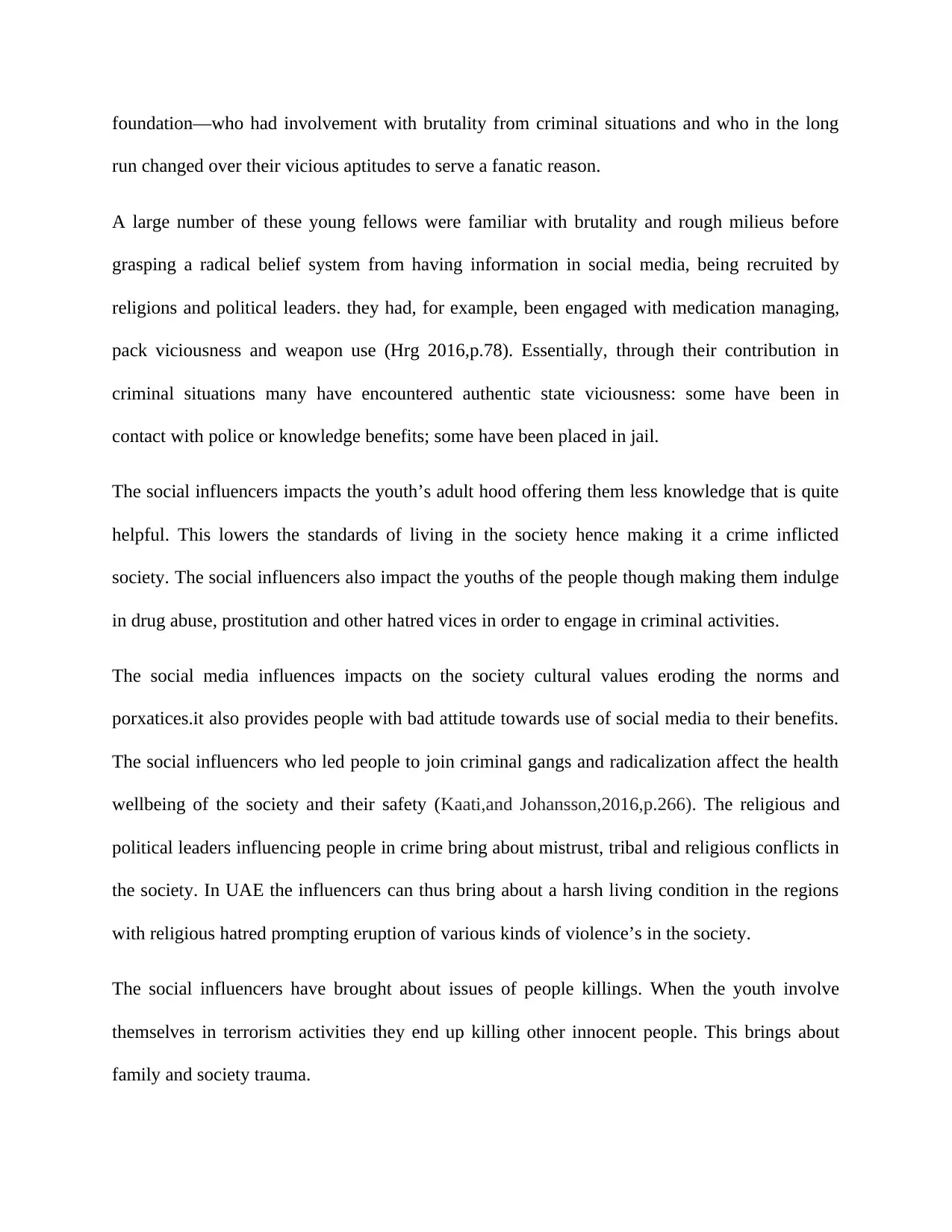
foundation—who had involvement with brutality from criminal situations and who in the long
run changed over their vicious aptitudes to serve a fanatic reason.
A large number of these young fellows were familiar with brutality and rough milieus before
grasping a radical belief system from having information in social media, being recruited by
religions and political leaders. they had, for example, been engaged with medication managing,
pack viciousness and weapon use (Hrg 2016,p.78). Essentially, through their contribution in
criminal situations many have encountered authentic state viciousness: some have been in
contact with police or knowledge benefits; some have been placed in jail.
The social influencers impacts the youth’s adult hood offering them less knowledge that is quite
helpful. This lowers the standards of living in the society hence making it a crime inflicted
society. The social influencers also impact the youths of the people though making them indulge
in drug abuse, prostitution and other hatred vices in order to engage in criminal activities.
The social media influences impacts on the society cultural values eroding the norms and
porxatices.it also provides people with bad attitude towards use of social media to their benefits.
The social influencers who led people to join criminal gangs and radicalization affect the health
wellbeing of the society and their safety (Kaati,and Johansson,2016,p.266). The religious and
political leaders influencing people in crime bring about mistrust, tribal and religious conflicts in
the society. In UAE the influencers can thus bring about a harsh living condition in the regions
with religious hatred prompting eruption of various kinds of violence’s in the society.
The social influencers have brought about issues of people killings. When the youth involve
themselves in terrorism activities they end up killing other innocent people. This brings about
family and society trauma.
run changed over their vicious aptitudes to serve a fanatic reason.
A large number of these young fellows were familiar with brutality and rough milieus before
grasping a radical belief system from having information in social media, being recruited by
religions and political leaders. they had, for example, been engaged with medication managing,
pack viciousness and weapon use (Hrg 2016,p.78). Essentially, through their contribution in
criminal situations many have encountered authentic state viciousness: some have been in
contact with police or knowledge benefits; some have been placed in jail.
The social influencers impacts the youth’s adult hood offering them less knowledge that is quite
helpful. This lowers the standards of living in the society hence making it a crime inflicted
society. The social influencers also impact the youths of the people though making them indulge
in drug abuse, prostitution and other hatred vices in order to engage in criminal activities.
The social media influences impacts on the society cultural values eroding the norms and
porxatices.it also provides people with bad attitude towards use of social media to their benefits.
The social influencers who led people to join criminal gangs and radicalization affect the health
wellbeing of the society and their safety (Kaati,and Johansson,2016,p.266). The religious and
political leaders influencing people in crime bring about mistrust, tribal and religious conflicts in
the society. In UAE the influencers can thus bring about a harsh living condition in the regions
with religious hatred prompting eruption of various kinds of violence’s in the society.
The social influencers have brought about issues of people killings. When the youth involve
themselves in terrorism activities they end up killing other innocent people. This brings about
family and society trauma.
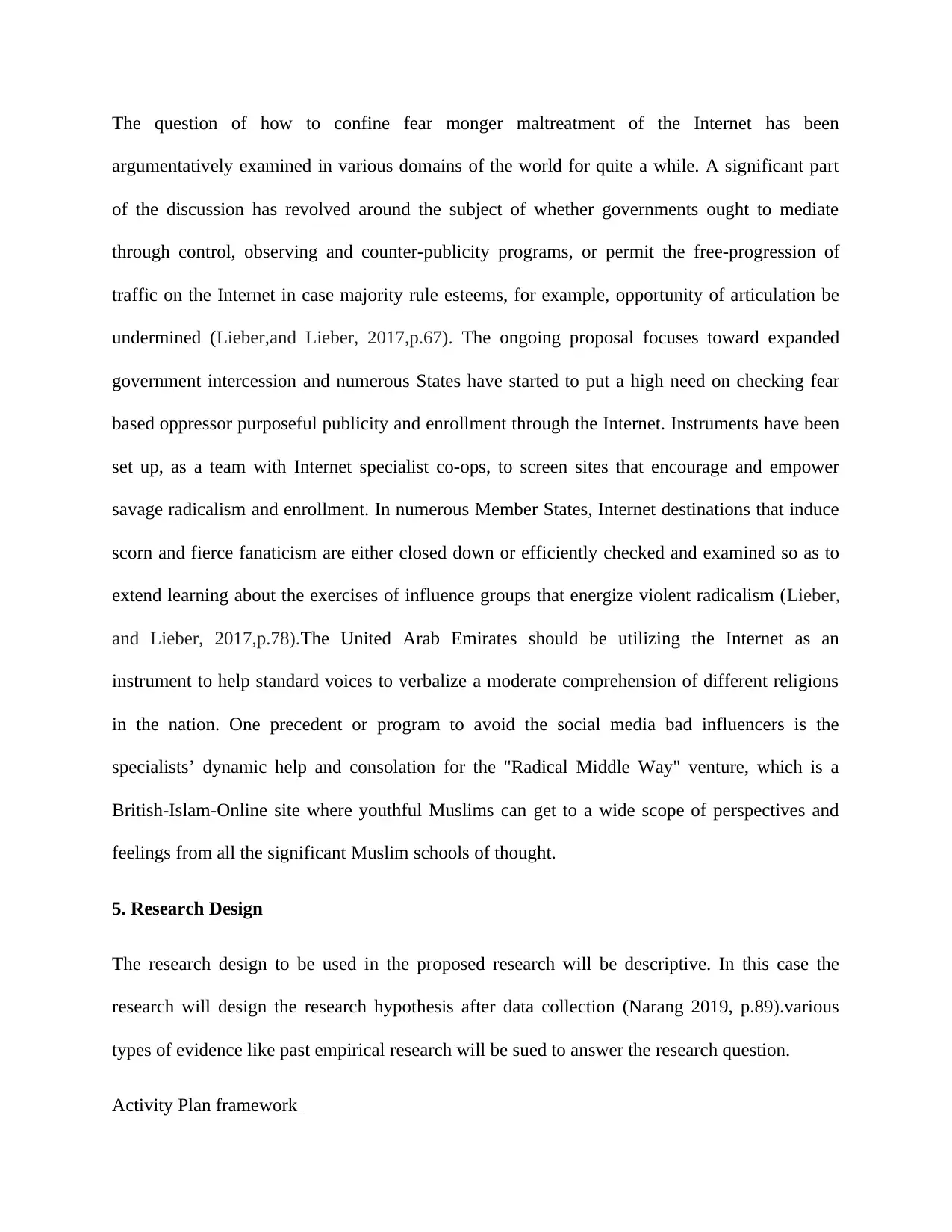
The question of how to confine fear monger maltreatment of the Internet has been
argumentatively examined in various domains of the world for quite a while. A significant part
of the discussion has revolved around the subject of whether governments ought to mediate
through control, observing and counter-publicity programs, or permit the free-progression of
traffic on the Internet in case majority rule esteems, for example, opportunity of articulation be
undermined (Lieber,and Lieber, 2017,p.67). The ongoing proposal focuses toward expanded
government intercession and numerous States have started to put a high need on checking fear
based oppressor purposeful publicity and enrollment through the Internet. Instruments have been
set up, as a team with Internet specialist co-ops, to screen sites that encourage and empower
savage radicalism and enrollment. In numerous Member States, Internet destinations that induce
scorn and fierce fanaticism are either closed down or efficiently checked and examined so as to
extend learning about the exercises of influence groups that energize violent radicalism (Lieber,
and Lieber, 2017,p.78).The United Arab Emirates should be utilizing the Internet as an
instrument to help standard voices to verbalize a moderate comprehension of different religions
in the nation. One precedent or program to avoid the social media bad influencers is the
specialists’ dynamic help and consolation for the "Radical Middle Way" venture, which is a
British-Islam-Online site where youthful Muslims can get to a wide scope of perspectives and
feelings from all the significant Muslim schools of thought.
5. Research Design
The research design to be used in the proposed research will be descriptive. In this case the
research will design the research hypothesis after data collection (Narang 2019, p.89).various
types of evidence like past empirical research will be sued to answer the research question.
Activity Plan framework
argumentatively examined in various domains of the world for quite a while. A significant part
of the discussion has revolved around the subject of whether governments ought to mediate
through control, observing and counter-publicity programs, or permit the free-progression of
traffic on the Internet in case majority rule esteems, for example, opportunity of articulation be
undermined (Lieber,and Lieber, 2017,p.67). The ongoing proposal focuses toward expanded
government intercession and numerous States have started to put a high need on checking fear
based oppressor purposeful publicity and enrollment through the Internet. Instruments have been
set up, as a team with Internet specialist co-ops, to screen sites that encourage and empower
savage radicalism and enrollment. In numerous Member States, Internet destinations that induce
scorn and fierce fanaticism are either closed down or efficiently checked and examined so as to
extend learning about the exercises of influence groups that energize violent radicalism (Lieber,
and Lieber, 2017,p.78).The United Arab Emirates should be utilizing the Internet as an
instrument to help standard voices to verbalize a moderate comprehension of different religions
in the nation. One precedent or program to avoid the social media bad influencers is the
specialists’ dynamic help and consolation for the "Radical Middle Way" venture, which is a
British-Islam-Online site where youthful Muslims can get to a wide scope of perspectives and
feelings from all the significant Muslim schools of thought.
5. Research Design
The research design to be used in the proposed research will be descriptive. In this case the
research will design the research hypothesis after data collection (Narang 2019, p.89).various
types of evidence like past empirical research will be sued to answer the research question.
Activity Plan framework
⊘ This is a preview!⊘
Do you want full access?
Subscribe today to unlock all pages.

Trusted by 1+ million students worldwide
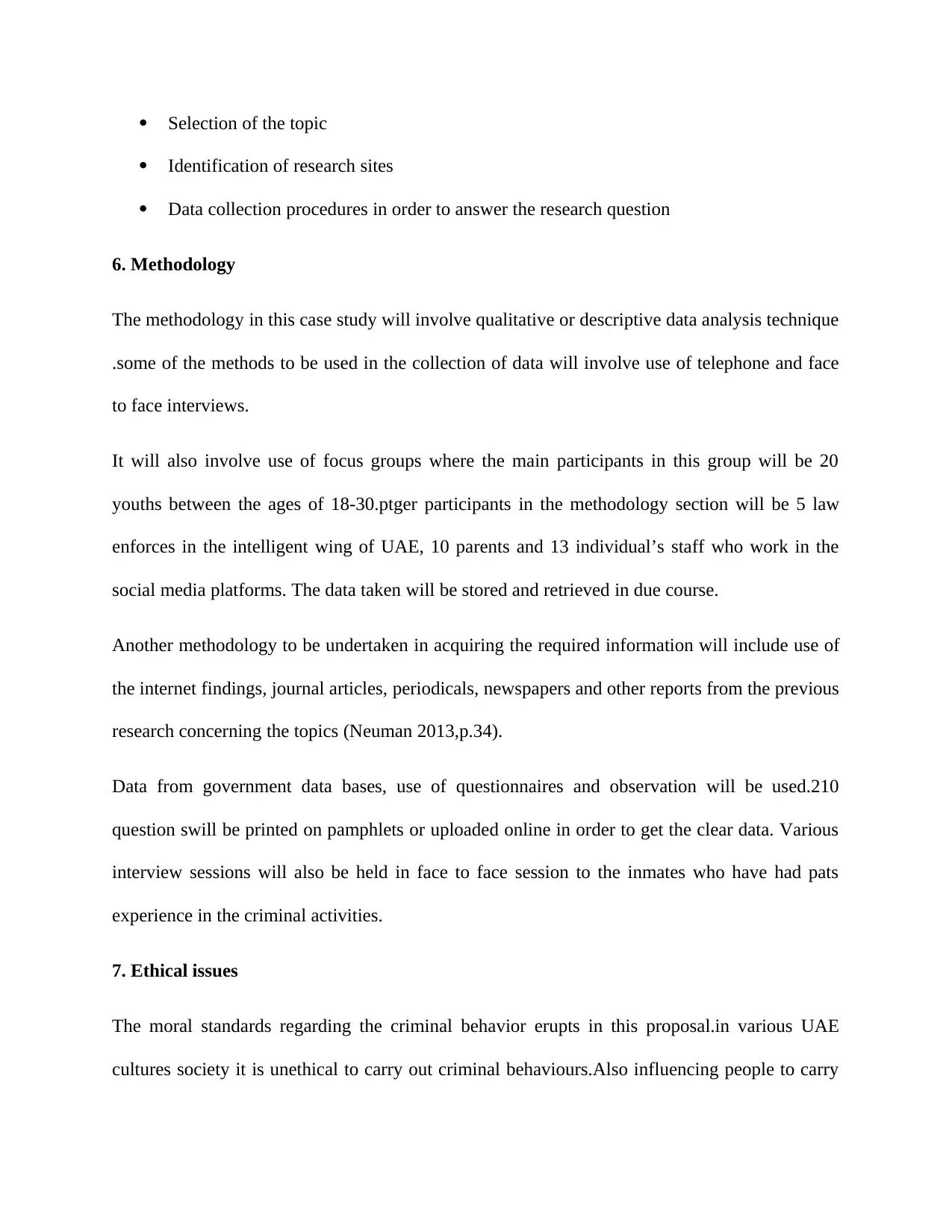
Selection of the topic
Identification of research sites
Data collection procedures in order to answer the research question
6. Methodology
The methodology in this case study will involve qualitative or descriptive data analysis technique
.some of the methods to be used in the collection of data will involve use of telephone and face
to face interviews.
It will also involve use of focus groups where the main participants in this group will be 20
youths between the ages of 18-30.ptger participants in the methodology section will be 5 law
enforces in the intelligent wing of UAE, 10 parents and 13 individual’s staff who work in the
social media platforms. The data taken will be stored and retrieved in due course.
Another methodology to be undertaken in acquiring the required information will include use of
the internet findings, journal articles, periodicals, newspapers and other reports from the previous
research concerning the topics (Neuman 2013,p.34).
Data from government data bases, use of questionnaires and observation will be used.210
question swill be printed on pamphlets or uploaded online in order to get the clear data. Various
interview sessions will also be held in face to face session to the inmates who have had pats
experience in the criminal activities.
7. Ethical issues
The moral standards regarding the criminal behavior erupts in this proposal.in various UAE
cultures society it is unethical to carry out criminal behaviours.Also influencing people to carry
Identification of research sites
Data collection procedures in order to answer the research question
6. Methodology
The methodology in this case study will involve qualitative or descriptive data analysis technique
.some of the methods to be used in the collection of data will involve use of telephone and face
to face interviews.
It will also involve use of focus groups where the main participants in this group will be 20
youths between the ages of 18-30.ptger participants in the methodology section will be 5 law
enforces in the intelligent wing of UAE, 10 parents and 13 individual’s staff who work in the
social media platforms. The data taken will be stored and retrieved in due course.
Another methodology to be undertaken in acquiring the required information will include use of
the internet findings, journal articles, periodicals, newspapers and other reports from the previous
research concerning the topics (Neuman 2013,p.34).
Data from government data bases, use of questionnaires and observation will be used.210
question swill be printed on pamphlets or uploaded online in order to get the clear data. Various
interview sessions will also be held in face to face session to the inmates who have had pats
experience in the criminal activities.
7. Ethical issues
The moral standards regarding the criminal behavior erupts in this proposal.in various UAE
cultures society it is unethical to carry out criminal behaviours.Also influencing people to carry
Paraphrase This Document
Need a fresh take? Get an instant paraphrase of this document with our AI Paraphraser
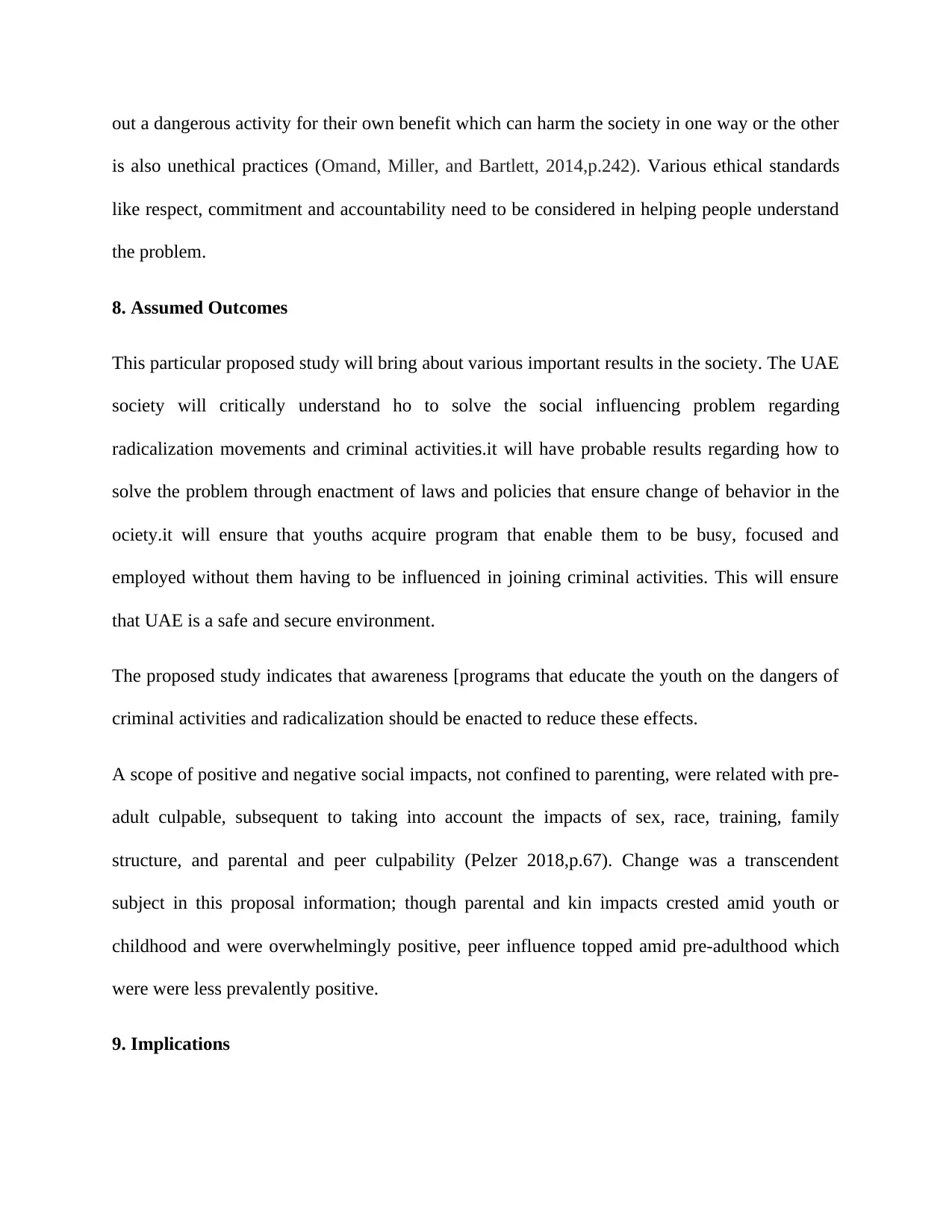
out a dangerous activity for their own benefit which can harm the society in one way or the other
is also unethical practices (Omand, Miller, and Bartlett, 2014,p.242). Various ethical standards
like respect, commitment and accountability need to be considered in helping people understand
the problem.
8. Assumed Outcomes
This particular proposed study will bring about various important results in the society. The UAE
society will critically understand ho to solve the social influencing problem regarding
radicalization movements and criminal activities.it will have probable results regarding how to
solve the problem through enactment of laws and policies that ensure change of behavior in the
ociety.it will ensure that youths acquire program that enable them to be busy, focused and
employed without them having to be influenced in joining criminal activities. This will ensure
that UAE is a safe and secure environment.
The proposed study indicates that awareness [programs that educate the youth on the dangers of
criminal activities and radicalization should be enacted to reduce these effects.
A scope of positive and negative social impacts, not confined to parenting, were related with pre-
adult culpable, subsequent to taking into account the impacts of sex, race, training, family
structure, and parental and peer culpability (Pelzer 2018,p.67). Change was a transcendent
subject in this proposal information; though parental and kin impacts crested amid youth or
childhood and were overwhelmingly positive, peer influence topped amid pre-adulthood which
were were less prevalently positive.
9. Implications
is also unethical practices (Omand, Miller, and Bartlett, 2014,p.242). Various ethical standards
like respect, commitment and accountability need to be considered in helping people understand
the problem.
8. Assumed Outcomes
This particular proposed study will bring about various important results in the society. The UAE
society will critically understand ho to solve the social influencing problem regarding
radicalization movements and criminal activities.it will have probable results regarding how to
solve the problem through enactment of laws and policies that ensure change of behavior in the
ociety.it will ensure that youths acquire program that enable them to be busy, focused and
employed without them having to be influenced in joining criminal activities. This will ensure
that UAE is a safe and secure environment.
The proposed study indicates that awareness [programs that educate the youth on the dangers of
criminal activities and radicalization should be enacted to reduce these effects.
A scope of positive and negative social impacts, not confined to parenting, were related with pre-
adult culpable, subsequent to taking into account the impacts of sex, race, training, family
structure, and parental and peer culpability (Pelzer 2018,p.67). Change was a transcendent
subject in this proposal information; though parental and kin impacts crested amid youth or
childhood and were overwhelmingly positive, peer influence topped amid pre-adulthood which
were were less prevalently positive.
9. Implications
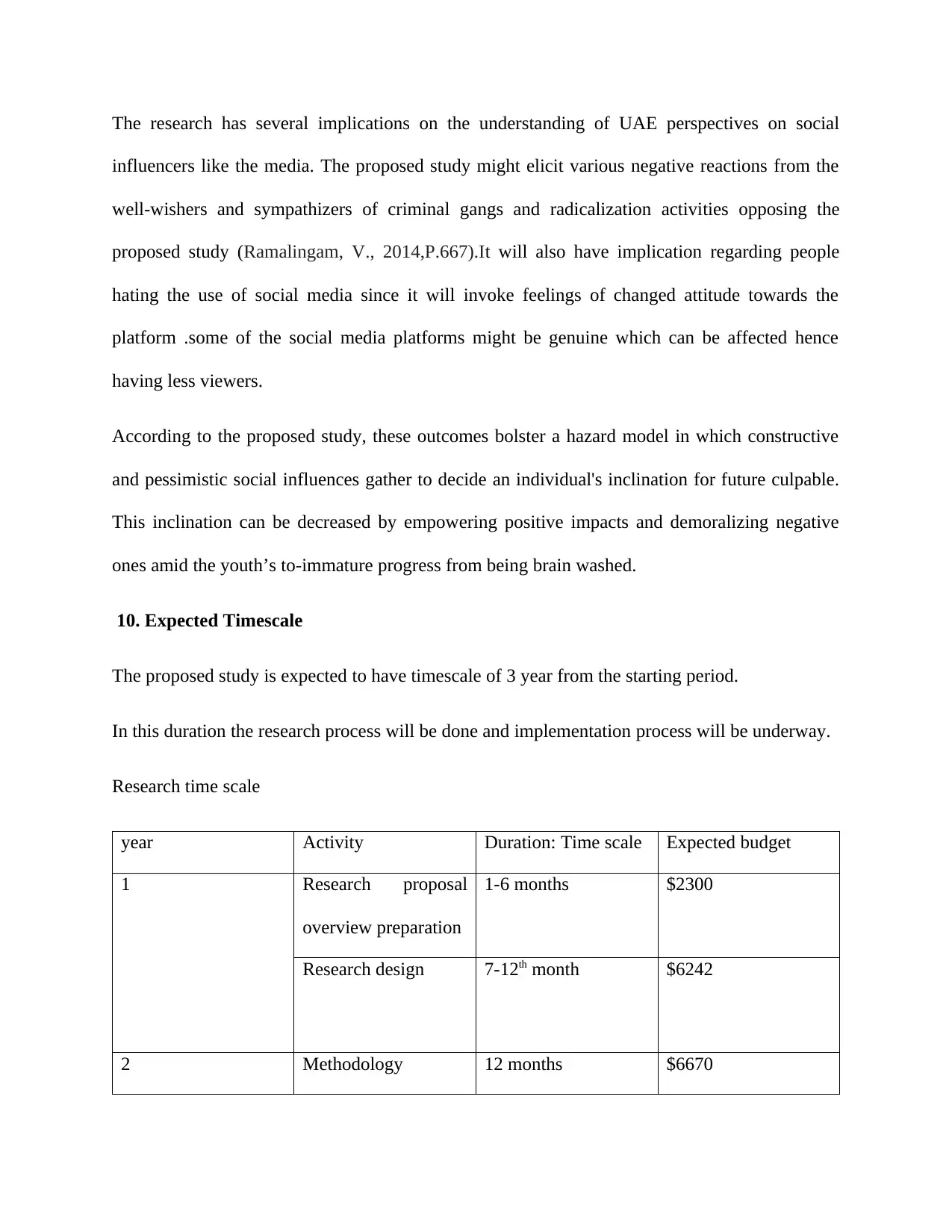
The research has several implications on the understanding of UAE perspectives on social
influencers like the media. The proposed study might elicit various negative reactions from the
well-wishers and sympathizers of criminal gangs and radicalization activities opposing the
proposed study (Ramalingam, V., 2014,P.667).It will also have implication regarding people
hating the use of social media since it will invoke feelings of changed attitude towards the
platform .some of the social media platforms might be genuine which can be affected hence
having less viewers.
According to the proposed study, these outcomes bolster a hazard model in which constructive
and pessimistic social influences gather to decide an individual's inclination for future culpable.
This inclination can be decreased by empowering positive impacts and demoralizing negative
ones amid the youth’s to-immature progress from being brain washed.
10. Expected Timescale
The proposed study is expected to have timescale of 3 year from the starting period.
In this duration the research process will be done and implementation process will be underway.
Research time scale
year Activity Duration: Time scale Expected budget
1 Research proposal
overview preparation
1-6 months $2300
Research design 7-12th month $6242
2 Methodology 12 months $6670
influencers like the media. The proposed study might elicit various negative reactions from the
well-wishers and sympathizers of criminal gangs and radicalization activities opposing the
proposed study (Ramalingam, V., 2014,P.667).It will also have implication regarding people
hating the use of social media since it will invoke feelings of changed attitude towards the
platform .some of the social media platforms might be genuine which can be affected hence
having less viewers.
According to the proposed study, these outcomes bolster a hazard model in which constructive
and pessimistic social influences gather to decide an individual's inclination for future culpable.
This inclination can be decreased by empowering positive impacts and demoralizing negative
ones amid the youth’s to-immature progress from being brain washed.
10. Expected Timescale
The proposed study is expected to have timescale of 3 year from the starting period.
In this duration the research process will be done and implementation process will be underway.
Research time scale
year Activity Duration: Time scale Expected budget
1 Research proposal
overview preparation
1-6 months $2300
Research design 7-12th month $6242
2 Methodology 12 months $6670
⊘ This is a preview!⊘
Do you want full access?
Subscribe today to unlock all pages.

Trusted by 1+ million students worldwide
1 out of 16
Related Documents
Your All-in-One AI-Powered Toolkit for Academic Success.
+13062052269
info@desklib.com
Available 24*7 on WhatsApp / Email
![[object Object]](/_next/static/media/star-bottom.7253800d.svg)
Unlock your academic potential
Copyright © 2020–2026 A2Z Services. All Rights Reserved. Developed and managed by ZUCOL.





